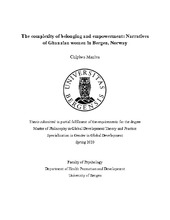The complexity of belonging and empowerment: Narratives of Ghanaian women in Bergen, Norway
Master thesis
Permanent lenke
https://hdl.handle.net/1956/22846Utgivelsesdato
2020-06-23Metadata
Vis full innførselSamlinger
- Master theses [165]
Sammendrag
Studies on migrant womens’ experiences of belonging and empowerment have for the most part remained separate, as two distinct fields. This study attempts to fill that gap by examining the experiences and perceptions of belonging and empowerment among Ghanaian women in Bergen. This includes the implications of the role of empowerment on their overall experiences of belonging. This study also presents a counter-narrative study to existing migration studies in Norway that focus less on African migrant groups, suggesting instead that there is a need for more research on Ghanaian migrants, even though they make up much less of the total number of migrants in Norway. The focus on lived experiences of this minority group in this study gives these women a voice, with the hopes that the insights from this research will aid the transformation of structures and policies in Norway. The study specifically explores the role of self-identity in Ghanaian women’s perspectives and experiences of belonging. Whilst highlighting their perceptions and experiences of (not)belonging and dis(empowerment), and their interactions, it also examines particularly their agency, illustrating the various strategies they utilize as a response to the experiences of not-belonging and disempowerment, through the use of “home-making” practices, among other factors. Data was collected through in-depth semi structured interviews and observations with 8 Ghanaian mothers. The data was analyzed using the theories of “belonging” (Antonsich, 2010), “gender accountability” (Zimmerman & West, 2009) and “empowerment” (Mosdale, 2010), along with relevant literature reviewed. Braun and Clarke’s (2006) method of thematic analysis was used for interpreting, analyzing and defining common themes, as conceptualized by the Ghanaian women. The study found that the experience of belonging and empowerment is not a homogenous experience, even among a common group with similar national and cultural identity. Despite their diverse and complex accounts, it was widely accepted that belonging was perceived as an empowering resource, and vice versa. Therefore, even though there was some sense of not-belonging and disempowerment experienced, that comes with being a migrant, the women continue to utilize ways in which they can make Bergen “home” for themselves. The study highlights that the continuity of Ghanaian cultural practices provides a route to empowerment, and consequently some sense/form of belonging in helping them and their families adapt to the Norwegian environment. The role of their internal sense of self or rather, “power within” remains central in their overall perceptions of their daily lives in Bergen. All women revealed that their internal sense of self had increased in comparison to when they were in Ghana. Ghanaian women are therefore not merely powerless victims due to the various and intersecting social, cultural and political challenges experienced as African and Black migrants in Bergen, which implicates their sense of belonging and empowerment. They have developed coping strategies, providing a route to empowerment, as they continue to thrive and define success whilst negotiating some sense of empowerment and belonging for themselves in a different social, political and cultural context. This study contributes to discussions on identity, empowerment, belonging and Ghanaian culture and minority ethnic migrant women/mothers. Revealing how the sense of Otherness (as migrants who are Black and African) disrupts notions of belonging and empowerment, and how the utilization of cultural continuity, and their internal sense of power (power within), among other avenues of ‘belonging’ and ‘being’, is central to adapting in Bergen. By bridging empowerment and belonging, through research on a minority ethnic population, this study therefore creates new visibilities by bringing forward the complex realities of migrant experiences. Key words: agency, belonging, Ghanaian women, empowerment, identity, Norway, race
